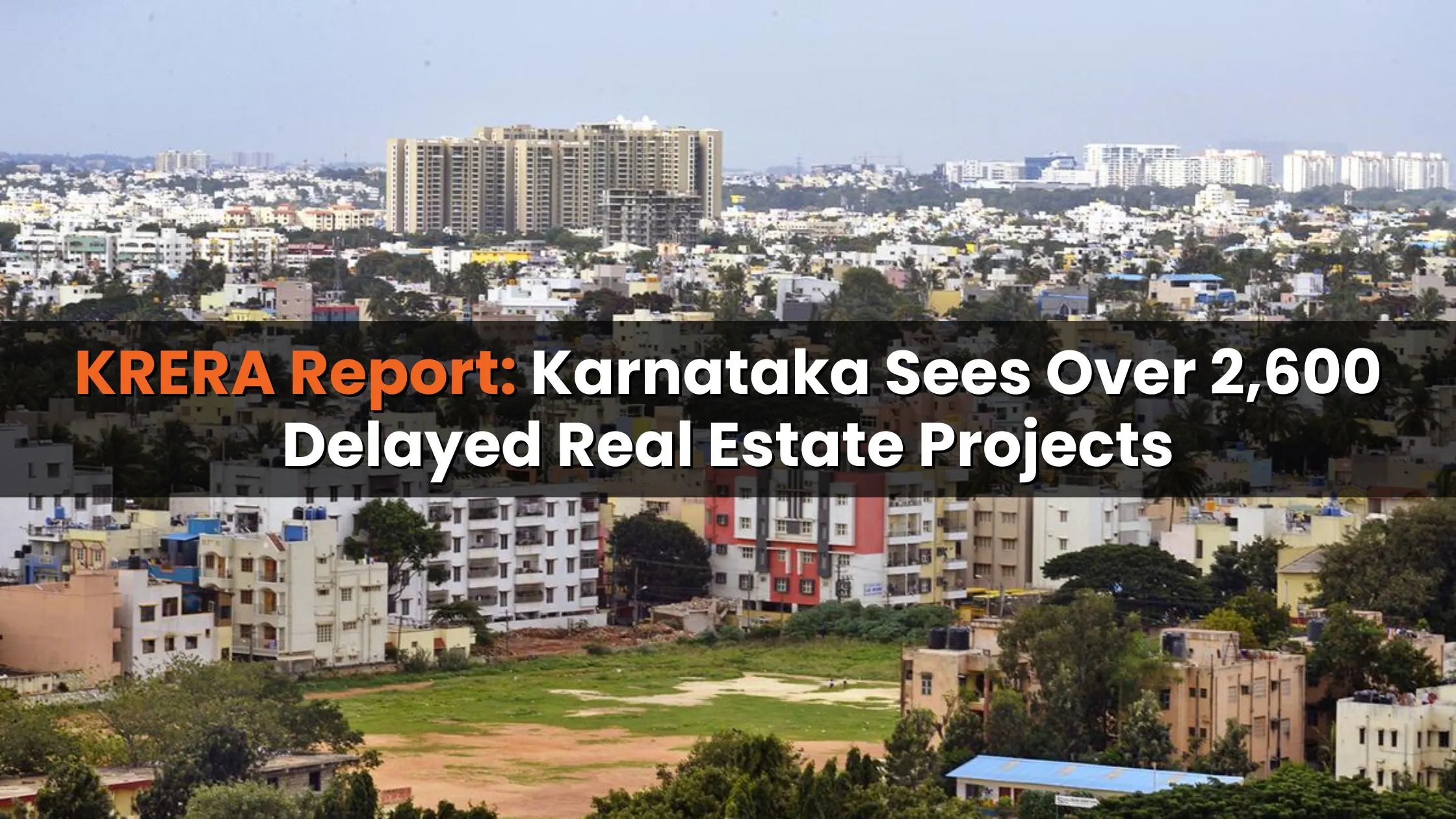Table of Content
▲
Introduction
The Karnataka Real Estate Regulatory Authority (KRERA) has released a significant update highlighting extensive delays in real estate projects across the state. With over 2,600 projects missing their scheduled deadlines and many facing indefinite delays, this situation poses challenges for homebuyers and the real estate sector alike. Bengaluru, the state's capital, is the most affected, contributing to nearly half of the delayed developments.
Key Statistics from the KRERA Update
The latest KRERA update paints a concerning picture for the real estate sector in Karnataka:
- Delayed Projects: More than 2,600 projects have surpassed their expected completion dates.
- Bengaluru’s Share: Of these, 1,301 projects are located in Bengaluru, marking it as the worst-hit region.
- Extension Requests: Approximately 1,007 projects have applied for deadline extensions, which are currently under review by KRERA.
Additionally, the authority revealed that real estate developers owe homebuyers approximately ₹667 crore in refunds due to delays, further exacerbating buyer grievances.
Reasons Behind the Delays
Several factors contribute to the delays in project completion, as outlined in the KRERA update:
- Regulatory Hurdles
Developers often face significant challenges in securing approvals and clearances from various government departments. These processes, involving environmental assessments, land use permits, and municipal body approvals, can take months or even years, delaying project initiation. - Financial Constraints
Real estate projects typically rely on customer advances and loans for funding. Sluggish sales, tightened credit availability, and instances of fund diversion have led to cash flow issues, causing projects to stall. - Poor Planning and Project Management
Inadequate feasibility studies and mismanagement of resources and timelines have plagued many projects. These issues result in execution challenges, further delaying project delivery.
Also Read: County Group Launches ₹1800 Crore Residential Project in Ghaziabad's Wave City
Bengaluru: The Epicenter of Delays
Bengaluru accounts for nearly 50% of the stalled projects in Karnataka. As a hub for urban development and real estate investments, the delays in the city have disrupted thousands of homebuyers' plans and slowed urban growth. Strategic projects in key locations within Bengaluru have seen prolonged timelines, affecting buyer confidence in the market.
Financial Implications
The financial burden on developers and homebuyers is staggering. KRERA reports indicate:
- Developers owe ₹667 crore in refunds due to delayed projects as of December 2024.
- Only ₹91.8 crore (14%) of approved refund claims have been successfully recovered.
- Pending recovery amounts have risen sharply, highlighting the difficulty in enforcing compliance.
KRERA’s Role and Recommendations
KRERA plays a critical role in regulating the real estate market and ensuring developers adhere to timelines. The authority has issued warnings to buyers, urging them to exercise caution when dealing with projects whose registrations have expired. Moving forward, KRERA must implement stricter compliance measures, enhance monitoring mechanisms, and penalize errant developers to foster accountability.
Impact on Homebuyers
The delays have caused significant financial and emotional distress for affected homebuyers. Many are burdened with loan repayments while waiting for their dream homes to be completed. Legal redressal mechanisms and timely KRERA interventions are essential to protect buyers' interests and instill confidence in the real estate market.
Conclusion
The KRERA update sheds light on the pressing issues plaguing Karnataka’s real estate sector. The extensive delays, especially in Bengaluru, underscore the need for improved regulatory oversight, better financial planning by developers, and stricter compliance mechanisms. Collaborative efforts between developers, regulators, and stakeholders are crucial to restoring trust and ensuring the timely delivery of projects in the future.
As the state navigates these challenges, the resolution of existing delays and the implementation of robust measures will be pivotal for the sector's growth and sustainability.
Follow AquireAcers Whatsapp Channel to Stay Updated With The Latest Real Estate News






_1771582392.webp)
_1771577585.webp)
Ans 1. The KRERA update highlights a concerning trend of delayed real estate projects in Karnataka, with over 2,600 projects missing their completion deadlines. This issue sheds light on the inefficiencies in project planning and execution, and the resulting impact on homebuyers and the real estate market.
Ans 2. As a hub for urban development and real estate investments, Bengaluru has a higher concentration of ongoing projects. The city accounts for nearly 50% of the stalled projects due to regulatory hurdles, financial constraints, and project mismanagement, disrupting homebuyers' plans and slowing urban growth.
Ans 3. Delays can be attributed to several factors, including challenges in obtaining government approvals, financial constraints faced by developers, and poor planning or resource management. These combined issues have prolonged the timelines of many projects.
Ans 4. Delays can be attributed to several factors, including challenges in obtaining government approvals, financial constraints faced by developers, and poor planning or resource management. These combined issues have prolonged the timelines of many projects.
Ans 5. Homebuyers face significant financial stress due to delays, as they are often required to continue paying EMIs on home loans while waiting for project completion. The delayed possession of their homes also adds to their emotional and economic burdens.
Ans 6. Developers collectively owe homebuyers approximately ₹667 crore in refunds due to project delays. However, only 14% of the approved refund claims (₹91.8 crore) have been recovered, leaving a large amount still pending, which exacerbates buyer grievances.
Ans 7. KRERA is responsible for regulating and monitoring real estate projects to ensure developers adhere to timelines. It provides warnings to buyers, reviews extension requests, and enforces penalties on non-compliant developers. KRERA’s recommendations aim to enhance accountability and restore buyer confidence.
Ans 8. To resolve the delays, collaborative efforts between regulators, developers, and stakeholders are essential. Developers need to improve financial planning and project management, while KRERA must implement stricter monitoring and compliance mechanisms. Timely resolution of buyer grievances is also crucial for rebuilding trust in the market.
Ans 9. The delays have tarnished the reputation of the real estate sector in Karnataka, particularly in Bengaluru. They have led to reduced buyer confidence, increased financial liabilities for developers, and a slowdown in urban development. Addressing these issues is critical for the sector's growth and long-term sustainability.